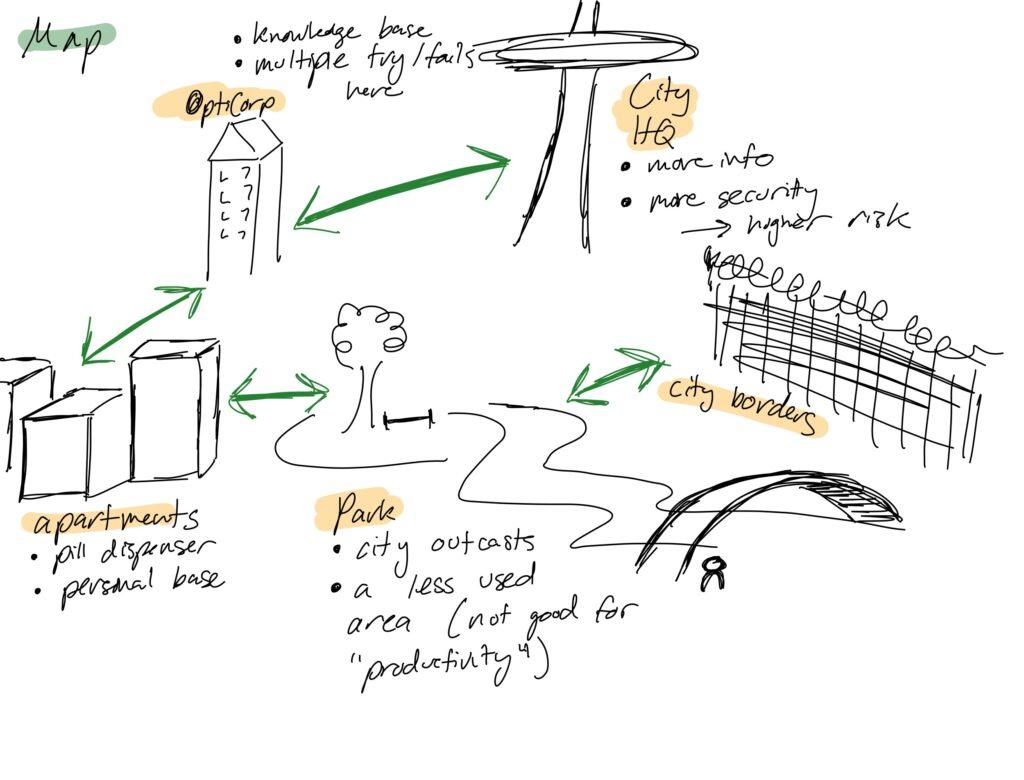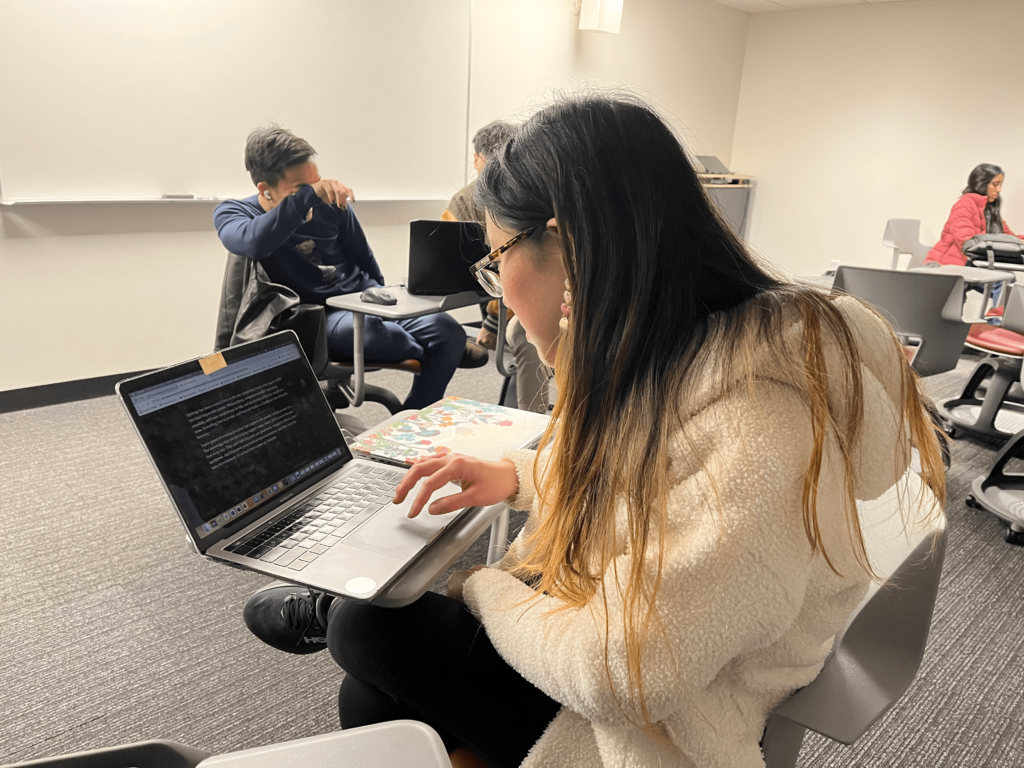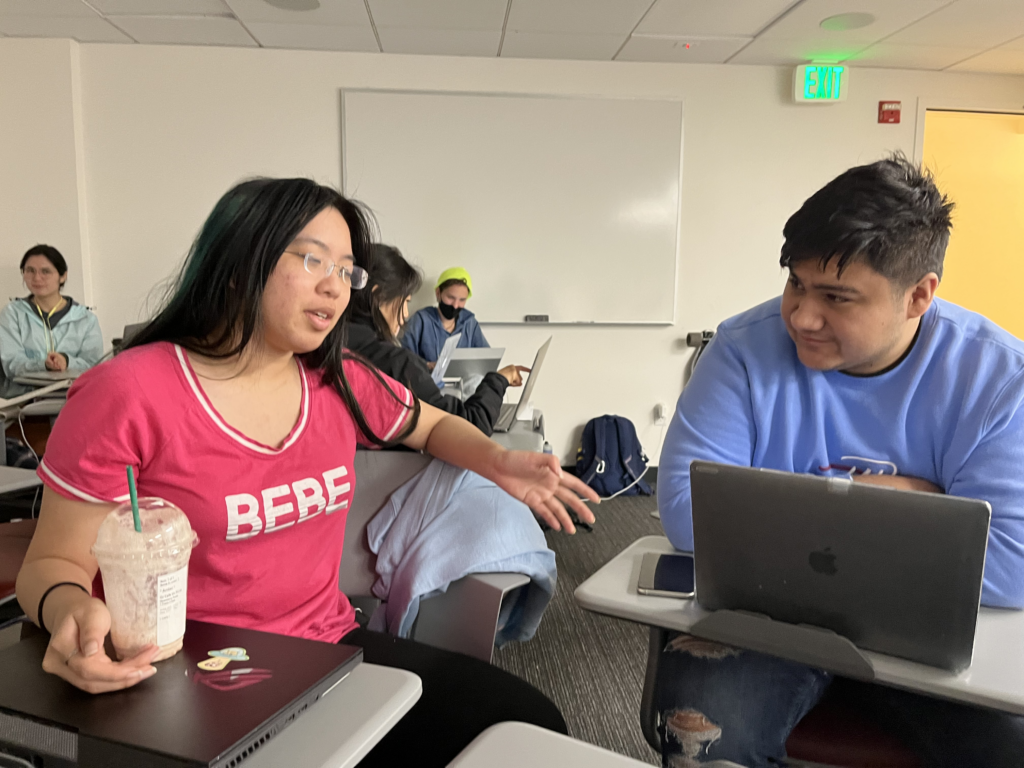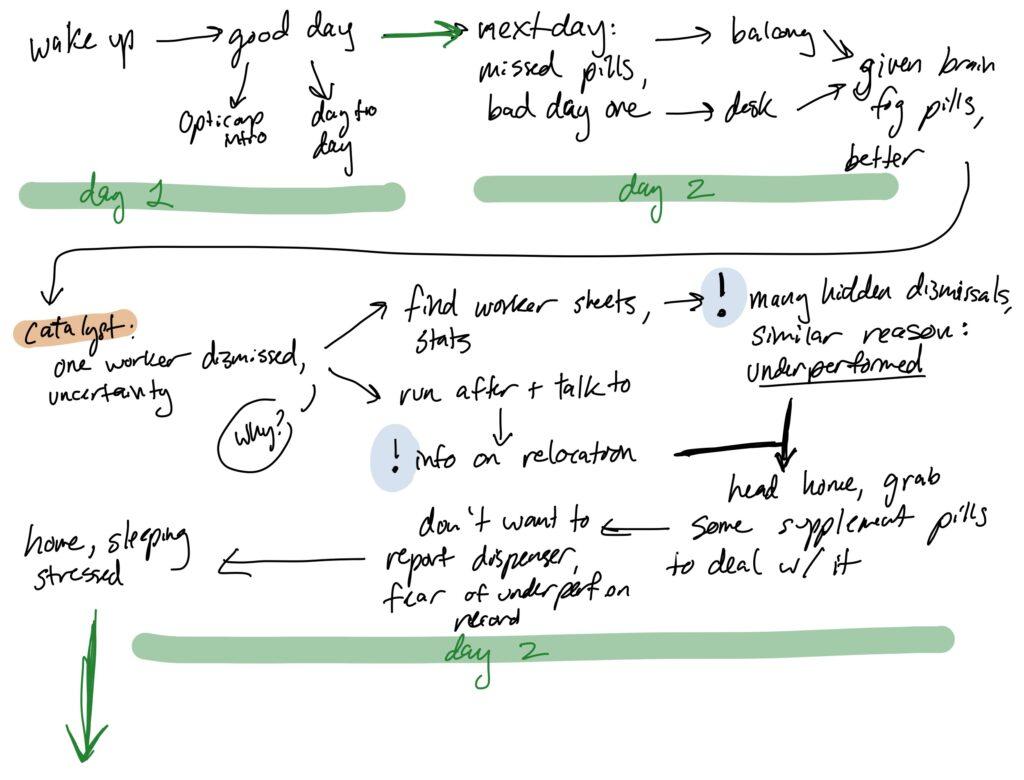(Highly recommend you have a few playthroughs before reading this page!)
Link to itch.io host page: https://tn-dev.itch.io/all-in-a-days-work
Premise:
All In A Day’s Work is set in a future city, where a company has figured out how to optimize the performance of an entire city, from timely schedules for delivering goods, to ensuring that any worker can be as productive as they can be. OptiCorp, the company, started by providing powerful medications that fixed most common health problems (colds, flu, etc) within hours. They expanded to making pills that supported workers in having an ideal work day, curing any brain fog, fatigue, or physical pain that would get in the way. Before long, nearly all residents of the city incorporated OptiCorp products into their lives, and the company expanded to influence all the companies and businesses that were there. Now, OptiCorp has created a utopian city where the potential of every person and process is utilized fully. “Productivity, at its best!”

The player plays as an employee at OptiCorp HQ, and they are proud of their work. Knowing that their role helps keep the city functioning smoothly, they are driven to do their best every day. They live a fairly stable and smooth life, as OptiCorp provides housing, guaranteed retirement, and many other benefits that support their life. They have been working at the HQ for about 6 months now, and have a steady routine in the city. All is well, until one day…
Players will gradually understand the main character (who they are playing as) and their life as they experience a day in their shoes. Through each day, the player will uncover more details about the main character as well as the city they live in. Each day has choices that will reveal information in different levels of detail, allowing the players to piece together the world as they go. With the information they gather, players will make choices that result in different endings. Multiple playthroughs will take players through the complex facets of this society, allowing them to see the broader picture.
By the end of the experience (in which I recommend multiple playthroughs), players should arrive at a greater awareness about how society emphasizes productivity on people. Ultimately, expecting constant and consistent high-performance from people will take a toll on them, seen through how workers at OptiCorp struggle to keep up without their pills, or if the pills don’t work on them. Outside of productivity, the more subtle aspect of this story tries to touch on some things about life that are worth putting attention and appreciation towards; nature, ties with family and friends, and the everyday roller coaster of emotions, struggles, and joys of life. There should be an appreciation for how these things affect our lifes; they make life so much richer. While productivity is necessary at times, particularly those who are motivated for personal reasons, it shouldn’t be expected constantly. Certainly, people can be assisted with supplements to aid them through a day, but taking things too far can sap the energy in people from other things in life.
Prototype development:
The original idea for All In A Day’s Work came from my personal experiences with being productive, particularly at Stanford. In today’s society, it seems like being productive is something that most people should/are expected to prioritize. At Stanford, it’s common to see others struggle to keep up, running on lack of sleep, or depending on caffeine to get them through a day. I wanted to create a society that shows why being productive all the time can’t be good, but I also wanted to touch on the reasons why someone might be motivated to. (This idea was less explored in this prototype due to time, but is hinted at in Alex’s character) I wanted to look at the different layers that exist within the idea of “needing something to help you stay productive,” from the struggle to perform in a setting that expects you to, to using some supplements to function in a day, to constantly using supplements to “perform” at a higher level. All of these exist today at some level, and so I wanted to take a look at each in this story.
Playtests were conducted throughout my development to gauge what the players were taking away from each iteration of the story and world. My earliest prototype involved the introduction, where I weave in worldbuilding as the player gets situated in the main character’s life and personality. It was important that the tone of the world was established early on, as it should seem like things are uncannily smooth in the main character’s life as well as the society. The dystopia is not upfront; the world should seemingly offer a utopian society, with the roots of a dystopia running underneath.


My first two playtests were focused on this early exposition. In feedback, I received good comments on the overall delivery of the setting and the main character’s life. Playtesters had a clear understanding of the world, including the unsettlingly happy outlook that the main character had. One playtester noted that the exposition set up space for darker undertones of the story, but noted that the reveal should be at the right time. I took this in mind, and wrote a reveal in the inciting incident (discovering a co-worker, Alex), to set the fast downhill slope of the opening plot. Another playtester got more emotionally invested, sad to see how the main character was dependent on the company pills to work through the day. They also commented on how the main character’s life seemed very monotonous. They got the impression that they had no friends, so I wanted to better situate the main character into a “good life.” In creating the rest of the story, I introduce a potential path of actions with their desk neighbor and friend, Avery. The main character’s social circle became intentionally limited as the story progressed, in order to highlight the consequence of prioritizing productivity in the character’s life.
As refinement continued, I received more positive feedback about how more aware players were feeling about productivity in today’s society after a playthrough. Players enjoyed seeing the different options they could take, as each decision shaped how much they knew about the world around them. Towards the end of the story, players were curious about how all the plot threads would be tied. Not wanting to limit the story and force a particular ending, I ended up creating a total of six endings, each suited to different paths through the story. Hopefully future players will enjoy them!
Final thoughts:
Overall, I learned quite a lot throughout this project. Writing in Twine for the first time was certainly fun, and I want to explore how I could utilize it to create more complex choices and consequences for the players. I haven’t written much fiction, and so it was my first time really engaging in a process to create the story. I found that a premise paragraph was very useful in making sure that I try to keep the core idea throughout. With interactive fiction, I found that drawing out a plot diagram and map was useful for keeping track of the story timeline, any choices, and where those events would take place. In the future, I want to better flesh out my text to provide more depth into the world. I would also like to add ambient sounds to provide a more immersive player experience. One stretch goal would be to pick up where I left off, and write a second chapter to this story!




The game asks us to reflect to what extremes we value efficiency and productivity and at what costs to our mental well-being. The game depicts what happens when we start relying on drugs to continuously work at peak productivity and how things like the grass and family start fading. It asks us if that’s what we want life to be. It’s in the details of the world the game is set in, such as everything running on time, the relentlessness of three strikes and you’re out, the job supplying the housing, insurance and food for employees, etc., that the game warns us of.
I thought you did a great job building a detailed dystopian world that showcased the extremes of our current society values of productivity. The little snippets of the player realizing they haven’t thought of their family in so long or the fact that they don’t know their coworkers or not being able to just enjoy being outside was very effective at emphasizing what might happen if we over-value productivity. The branching narrative medium was really effective in showcasing how our choices lead us to certain outcomes – ultimately we get to choose what we value individually, whether we keep up with the toxic productivity or make choices to find a way outside of that. I really enjoyed the ending where you let us know which ending we got and how many total endings there were. That prompted me to start over to try to get all the endings and heightened the importance of each choice in the story. I do think the ending felt a bit rushed, particularly the endings where the player meets Alex. It seemed like deus ex machina that Alex found a new way of life so soon and they could show the player this. I wonder logically if OptiCorp would even allow such a community to exist.
All In A Day’s Work is a utopian sci-fi story that teaches the consequences of making sacrifices to achieve “success” in a world that only values productivity. This compelling message is wrapped up in a narrative about deciding to take pills to boost our productivity or to reject the system and start remembering our humanity (for example, our family or our memories of the past). In this way, the game lets us see directly the consequences of overworking or of not working enough. I enjoyed that the game doesn’t necessarily project the value that productivity is always bad. For example, the Work, With Some Regrets ending displays a nuance that working is still important and necessary. Another ending I got, where we follow Alex into the non-OptiCorp-controlled portion of the city, offers a different view, that we can step away from a productivity-obsessed mindset to our benefit. Overall, I liked that AIADW took advantage of the conventions of IF and gave an ending that truly reflected the player’s choices. It felt like a mirror, reflecting back the values that the character exhibits along the way (either to be more productive or to start questioning the system). If the player worked a lot, they get an ending that shows the consequences of that. Likewise, if they reject the system, they get to see the consequences of that action as well.
I related to the game a lot, as someone that struggles with balancing productivity with the other important parts of life. The choices definitely felt consequential, since there were at least five or six different points where it felt like the story branched (I’m not sure if it actually did, but it felt like it did, and that was enough to make a reader feel like their decisions matter!). Overall, I thought the scale of the story was awesome–there’s a lot of worldbuilding that is done really well, and Alex is a recurring character that seems to remember actions that we took long before in the game, which makes the game feel quite immersive.
If you were to improve this project, I think the last setting, the part of town that Alex brings us to, could be better established. It was surprising that there is this part of town that exists outside of Opti-Corp’s dominion. Maybe reference it existing earlier in the story.